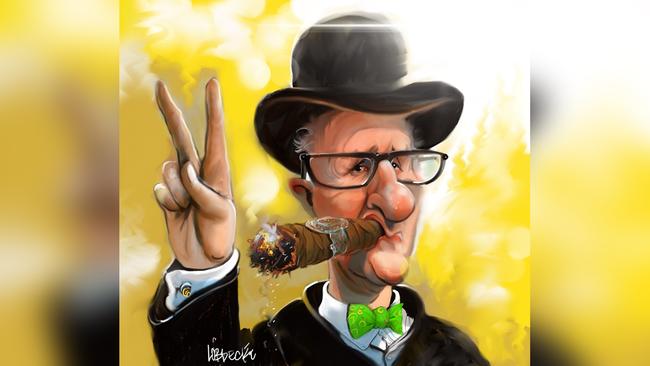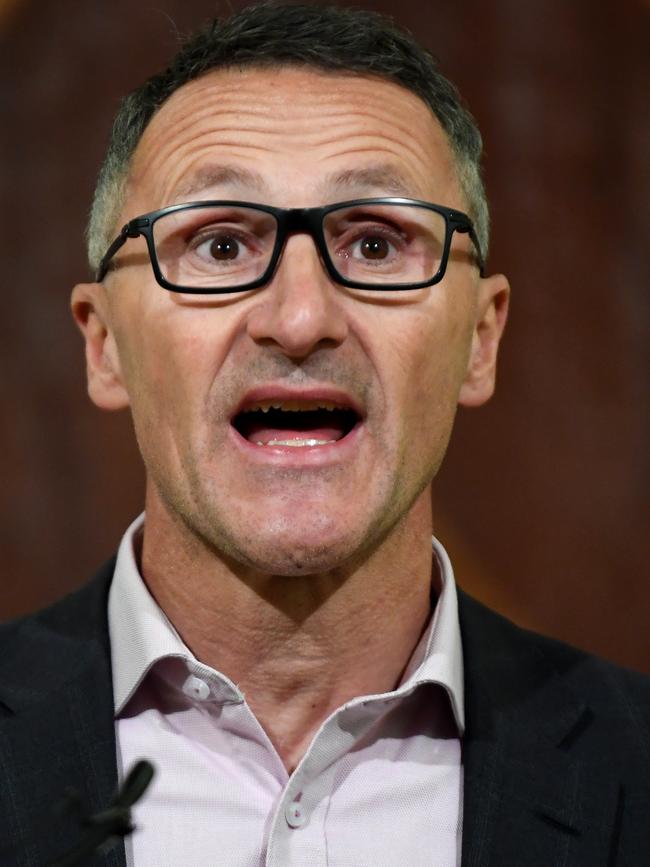
READ MORE: Hailstones and flames batter Queensland, a state of fire and ice | Alan Jones attacks Israel Folau for saying fires, drought are God’s punishment
As the fires raged and tempers flared, the Prime Minister admonished politicians for abandoning civility in a time of crisis. The Greens led the mob of radical incivility by charging people who dissent from the party’s preferred climate policy with arson. Greens senator Jordon Steele-John said the government was “no better than a bunch of arsonists”. Greens leader Richard Di Natale had set the tone for his team last Monday when he accused opponents of a new political crime we might call collective arson in absentia. He said: “Every politician, lobbyist, pundit and journalist who has fought to block serious action on climate change bears responsibility for the increasing risk from a heating planet that is producing these deadly bushfires.”
For civil society’s sake, unpack the untested hypothesis: journalists who disagree with Di Natale’s idea of “serious action on climate change” bear responsibility for deadly bushfires because they are increasing the risk from a heating planet that is producing fires. Only a party lost in a whirling dervish of circular logic could believe such nonsense.
The disaster-chasing Greens are to this century what ambulance-chasing lawyers were to the last. They are misery merchants who profit from tragedy and exploit people at their most vulnerable. The lower they descend into the politics of misery, the more people will flock to the major parties. Labor received the message loud and clear after the May election when its uncosted climate plan shed crucial votes. The ALP’s green idealism threatened the natural resource market, reliable energy supply and key exports while leaving the biggest carbon emitter in the world, China, relatively unscathed. Voters rejected Labor’s plan, including a 45 per cent greenhouse emissions target, after economist Brian Fisher estimated it could deliver a $53bn hit to GDP.

Labor’s official review of the 2019 election campaign concluded that the party lost because of a “cluttered” policy agenda, an unpopular leader and a poor sales pitch. It lost touch with the people because the party leadership is drawn from the ranks of career politicians. The most basic issue with the Labor campaign was substance, not style. The policy agenda might have been cluttered but the main problem was its basis in idealism rather than realism.
Many analysts warned Labor it should ditch political correctness, green idealism and a big-spending, big-taxing agenda. I argued its continuing refusal to make a case for key policies with due regard for the national interest would cost it dearly. Labor leader Anthony Albanese has decided the party cannot afford another round of blame-shifting and must address its failures head on. He is right. The Opposition Leader announced a new policy agenda based on five core themes: infrastructure, jobs, fairness, climate change and the national interest. It certainly sounds like a winning agenda for an election campaign. We know that with a fair degree of certainty since it so closely resembles the agenda that delivered victory for the Coalition. While Labor can improve its popularity by staking a claim on the political centre, it has less control over the growing stature and influence of the Prime Minister.
Scott Morrison is often underestimated and it has worked well for him. He took the Liberal leadership from behind as rivals Malcolm Turnbull and Peter Dutton failed to secure enough votes in the party room. He seized victory from the jaws of defeat as the underdog on election day. He was reviled by many nations at the Pacific Islands forum but made friends out of foes. He is walking the tightrope between the US and the emerging superpower China by insisting his number one priority is the national interest. He is redefining Australia’s identity in a new global order where nationalism is being embraced as the dream of universal liberalism fades away. And he has shed the arrogant image that made him appear a world apart from the people in the past.
In 2016, I watched election night on the ABC where Morrison and Penny Wong were asked about the rising popularity of minor parties. They responded in a similar manner, with views about people fearing change in a rapidly changing world and seeking certainty in non-traditional candidates. In a column on the election, I argued against the analysis: “The success of minor parties across the West owes to a growing gulf between the values of the political class and the people.” There was widespread concern about politicians “sacrificing the principles that sustain liberal democracy … government by the people and for the people, secular statehood, freedom of speech, sovereignty and secure borders”.
Three years on, global politics has changed radically. That both the PM and the Opposition Leader openly defend the national interest as the basis for Australia’s engagement in a globalised world marks a watershed moment in federal politics. In a landmark speech to the Lowy Institute, the Prime Minister said: “Under my leadership Australia’s international engagement will be squarely driven by Australia’s national interests.”
Before the advent of globalism, such a statement would have been uncontroversial. It has taken the threat of Islamist terrorism and communist China to make the national interest a critical priority for people who want to defend the free world and preserve the open societies of the West for future generations.
The Morrison government’s place in history is being defined by patriotism, realism and plans to make Australia debt-free. The opposition is a long way from home but Albanese knows Labor’s promised land is closer to the political centre than the green-left fringe.




At no time since the May election has the reason for the Coalition’s victory been clearer. During the past week, Australians punished by drought were devastated by bushfires. As the bush burned, people died, animals fled and desperate farmers tried to save their weakened stock, the Greens hurled abuse from the lunatic fringe. Labor was busy licking its wounds after a review attributed the party’s election defeat to a democratic deficit and surfeit of bad policy. Meanwhile, the Liberals set about finding the immediate cause of the bushfires, visiting devastated regions and organising critical support for fire-ravaged communities.